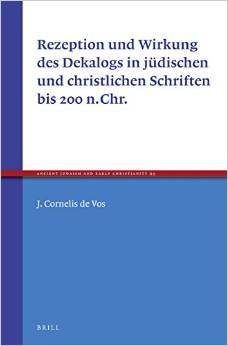DE VOS, J. C. Rezeption und Wirkung des Dekalogs in jüdischen und christlichen Schriften bis 200 n.Chr. Leiden: Brill, 2016, 510 p. – ISBN 9789004324381.
O livro, em alemão, examina o impacto e a recepção do Decálogo – os Dez Mandamentos – nos escritos judaicos e cristãos até o ano 200 d.C.
Por exemplo: o Decálogo na LXX, no Pentateuco Samaritano, nos Manuscritos de Qumran, na Peshitta, na Vetus Latina, em Fílon de Alexandria, em Flávio Josefo, nas cartas paulinas, nos Evangelhos Sinóticos, no Evangelho de João, nos apócrifos judaicos e cristãos, nos escritos gnósticos etc.
Diz a editora – que tem um preço proibitivo – em inglês e alemão:
J. Cornelis de Vos examines the impact and reception of the Decalogue up to 200 CE, scrutinizing the versions of the Decalogue, and the history of the Decalogue in ancient Jewish writings, the New Testament, and early Christian writings. Almost all texts show an interconnection of identity and normativity: the Decalogue functions as an expression of fundamental moral concepts of socio-religious groups. At the same time, these groups enhance the Decalogue with normativity—sometimes even expanding on it—to make it a text that generates their own identity. This is the first study that presents an in-depth and continuous analysis of the early history of the Decalogue.
Der Wirkung und Rezeption des Dekalogs bis 200 n.Chr. widmet sich J. Cornelis de Vos in dieser Studie. Dafür erforscht er zunächst die alten Textzeugen der beiden Dekalogfassungen, um anschließend zu fragen, wie die Zehn Gebote bei antik-jüdischen Autoren, im Neuen Testament sowie in frühchristlichen Schriften aufgenommen wurden. Es zeigt sich eine Verbindung von Normativität und Identität: Der Dekalog gilt zumeist als Ausdruck der moralischen Grundauffassungen sozioreligiöser Gruppen; er wird gleichzeitig von diesen Gruppen mit Normativität aufgeladen – manchmal sogar erweitert – gerade um als Identität stiftend für die eigene Gruppe zu gelten. Dies ist die erste Studie, die eine detaillierte und durchgehende Geschichte des Dekalogs in der Antike beschreibt.
Quem é o autor?
J. Cornelis de Vos, Ph.D. (2002, University of Groningen) is Adjunct Professor of Hellenistic Judaism and New Testament at the University of Münster, Cluster of Excellence “Religion and Politics”. He has published monographs and many articles on the Hebrew Bible, the New Testament, and ancient Jewish writings.
J. Cornelis de Vos, Dr. (2002, Universität Groningen) ist Privatdozent für Hellenistisches Judentum und Neues Testament an der Universität Münster, Exzellenzcluster “Religion und Politik”. Er hat Monografien und viele Artikel zur Hebräischen Bibel, dem Neuen Testament und antik-jüdischen Schriften veröffentlicht.

